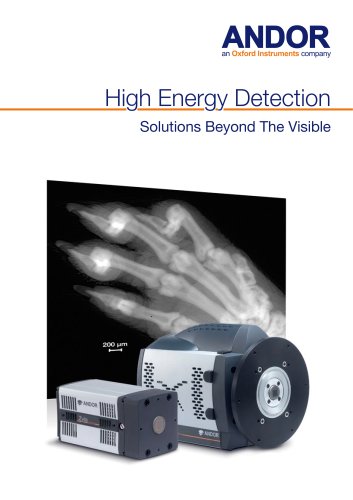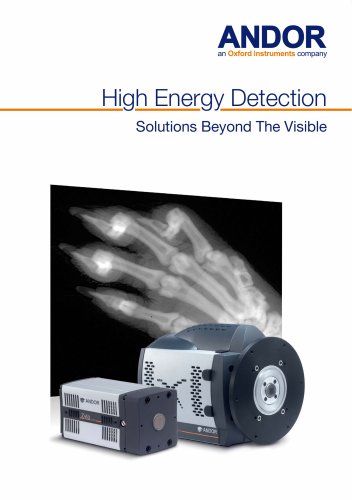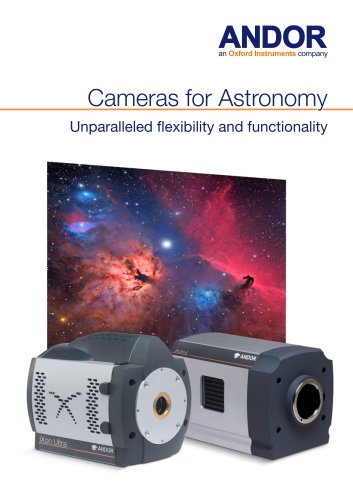
Catalog excerpts
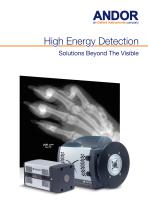
an Oxford Instruments company High Energy Detection Solutions Beyond The Visible
Open the catalog to page 1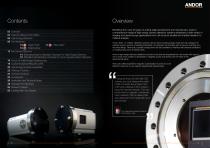
Contents 03 Overview 04 Detection Beyond The Visible 06 High Energy Detection 09 The Interfaces 10 O - ‘Open Front’ 11 F - ‘Fiber-Optic’ 12 Y - ‘Stand Alone’ 13 The Camera Platforms 14 Extending Andor’s ‘Standard’ Cameras For High Energy Detection 15 Standard Ultra Sensitive Cameras For Lens Coupled Indirect Detection 16 Focus On High Energy Spectroscopy 19 Customer Special Request (CSR) 20 High Energy Camera Capabilities 22 Defining A Solution 24 Software Solutions 25 Accessories 26 Application and Technical Notes 48 Standard Part Numbers 50 Research Papers 53 Looking After Your System...
Open the catalog to page 2
Detection Beyond The Visible Typical Application Andor’s high energy camera solutions cover a broad wavelength range, spanning VUV, EUV, X-Ray and gamma regions. Detection is achieved either through direct detection of the high energy photon by the sensor or by indirect detection of visible photons emitted from a phosphor or scintillator, either a fiber-optic or a lens coupled to the detector. Soft X-Ray Imaging / Microscopy Soft to Hard X-Ray X-Ray Spectroscopy (e.g. SAXA), Plasma Diagnostics Hard X-Ray Diffraction / Crystallography, Phase Contrast Imaging Hard X-Ray to Gamma Gamma...
Open the catalog to page 3
High Energy Detection The two main methods of detecting high energy photons with scientific cameras are ‘Direct’ and ‘Indirect’ detection. Direct Detection Indirect Detection Andor employs the notation ‘S’ to indicate cameras that are optimal for detection of ‘soft’ lower energy photons. With direct detection, the incident VUV to soft X-Ray photon is absorbed directly within the silicon of the sensor resulting in the production of multiple electron-hole pairs. This method of detection limits the range of usage of the sensor to photon energies that silicon can absorb directly, as shown in...
Open the catalog to page 4
The Interfaces Andor has a comprehensive portfolio of imaging and spectroscopic camera platforms developed for use in a wide range of high energy applications. To suit these many different requirements it is often necessary to modify the camera’s interface to allow optimal integration with the sampling environment. The large area X-Ray Andor CCD system has been used to acquire much more data on each shot, enabling researchers using the Central Laser Facilities to make significantly faster progress than previously possible. This section highlights Andor’s dedicated range of interface types...
Open the catalog to page 5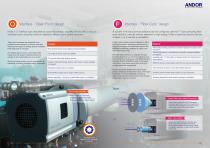
Interface - ‘Open Front’ design Interface - ‘Fiber-Optic’ design Andor’s ’O’ interface type describes an open front design, coupling directly onto a vacuum chamber’s port, ensuring maximum detection efficiency and spatial resolution. A number of Andor’s camera platforms can be configured with the ‘F’ type protruding fiberoptic interface, ideal for indirect detection of high energy X-Ray or gamma photons that are incident on a phosphor or scintillator. ‘Open front’ cameras are designed to be coupled to the outside of a vacuum chamber. There are two types of sealing options available: knife...
Open the catalog to page 6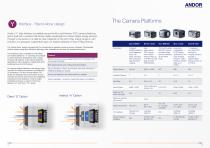
Interface - ‘Stand Alone’ design Andor’s ‘Y’ style interface is available across the iKon and Newton CCD camera platforms, and is built with a window that blocks visible wavelengths but allows higher energy photons through to the sensor. It is ideal for direct detection in the soft X-Ray energy range or, with inclusion of a phosphor coated fiber-optic, for indirect detection of hard X-Ray photons. Description Compact sCMOS platform, multi megapixel array, lownoise, ultra fast frame rates and high resolution imaging. High performance CCD camera with variable readout rates up to 3 MHz through...
Open the catalog to page 7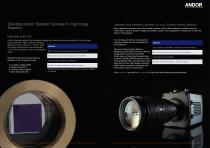
Extending Andor’s ‘Standard’ Cameras For High Energy Detection Standard Ultra Sensitive Cameras For Lens Coupled Indirect Detection Many applications require use of lens based cameras within indirect detection systems, where a ‘stand alone’ camera solution images a scintillator screen. Such applications include both X-Ray and Neutron Tomography. Extending to the ‘UV’ Andor’s standard range of ultra-sensitive imaging and spectroscopy camera platforms can be readily customized with a MgF2 window, extending detection in the UV down to ~120 nm. Note, Features the system performance is also...
Open the catalog to page 8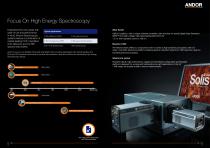
Focus On High Energy Spectroscopy Engineered from the outset with ease-of-use and performance in mind, Andor’s Spectroscopy systems feature a combination of market leading CCD, Intensified CCD detectors and UV-NIR spectral instruments. iStar ICCD Typical Applications X-Ray Diffraction (XRD) X-Ray plasma physics X-Ray laser characterization USB 2.0 platform, with a unique software controlled, ultra-low-jitter on-board Digital Delay Generator (DDG™) and high-voltage, high-speed gating electronics for < 2 ns time resolution down to 120 nm. Andor’s vacuum-compatible CCDs and Intensified CCDs...
Open the catalog to page 9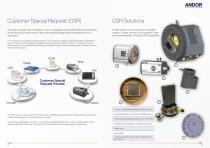
Customer Special Request (CSR) At Andor we realise that, sometimes, even our adaptable and flexible off-the-shelf products are not enough to meet some of the more demanding application requirements of our customers. A CSR solution can encompass a complete system, a single camera or an accessory. Here are some examples of Andor’s CSR capabilities. For this reason we provide a bespoke service to our customers, whereby a dedicated highly experienced team of engineers and application specialists provide customer specific solutions. The process involves discussing your core requirements,...
Open the catalog to page 10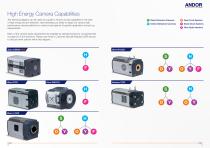
High Energy Camera Capabilities The following diagram can be used as a guide to Andor’s broad capabilities in the area of high energy photon detection, demonstrating our ability to adapt our various highperformance camera platforms to meet a broad gamut of specific application and set-up requirements. S Direct Detection Cameras O Open Front Systems H Indirect Detection Cameras Y Stand Alone Systems F Fiber Optic Interface Many of the camera types represented are available as standard products, as represented on page 50 of this brochure. Please use Andor’s Customer Special Request (CSR)...
Open the catalog to page 11All Andor Technology catalogs and technical brochures
-
Marana sCMOS
9 Pages
-
MicroPoint 4
9 Pages
-
ZL41 Cell sCMOS
7 Pages
-
Sona sCMOS
9 Pages
-
Optistat
11 Pages
-
Multi-Wavelength Imaging
11 Pages
-
BC43
13 Pages
-
andor-kymera-193-specifications
15 Pages
-
andor-dragonfly-specifications
14 Pages
-
Solis-Brochure
6 Pages
-
Spectroscopy-Solutions-Brochure
24 Pages
-
iKon-M/L SO Series
10 Pages
-
iStar CCD and sCMOS
8 Pages
-
Neo 5.5 sCMOS
6 Pages
-
Mechelle 5000
5 Pages
-
Cameras for Astronomy
8 Pages
-
Microspectroscopy Gatefold
8 Pages
-
Spectroscopy Brochure
25 Pages
-
Apogee Alta F9000
5 Pages
-
Apogee Aspen CG230
5 Pages
-
Apogee Aspen CG47
5 Pages
-
Apogee Aspen CG6
5 Pages
-
ApogeeAspen CG9000
5 Pages
-
iXon EMCCD
13 Pages
-
Zyla for Physical Sciences sCMOS
12 Pages
-
iVac OEM 2
2 Pages
-
iKon-M OEM 2-page PV
2 Pages
-
iKon-M X-Ray 2
2 Pages
-
Newton EMCCD
16 Pages
-
iQ Software
12 Pages
-
sCMOS
16 Pages
-
Luca vs Interline CCD
6 Pages
-
Low Light Imaging
8 Pages
-
Darkcurrent
3 Pages
-
iXon Back-illuminated
6 Pages
-
Revolution
23 Pages
-
Clara Flyer
2 Pages
-
PRODUCT PORTFOLIO 2013
51 Pages
-
Andor Revolution XD brochure
23 Pages
-
Revolution DSD
11 Pages
-
Active Illumination Solutions
25 Pages
-
Clara Interline CCD Series
2 Pages
-
Intensified Camera Series
9 Pages
-
Neo and Zyla sCMOS
27 Pages
-
iXon
33 Pages
Archived catalogs
-
High Energy Detection_2019
8 Pages
-
Astronomy Brochure_2014
19 Pages
-
Astronomy Brochure
19 Pages
-
iKon-M USB X-Ray Brochure
2 Pages

